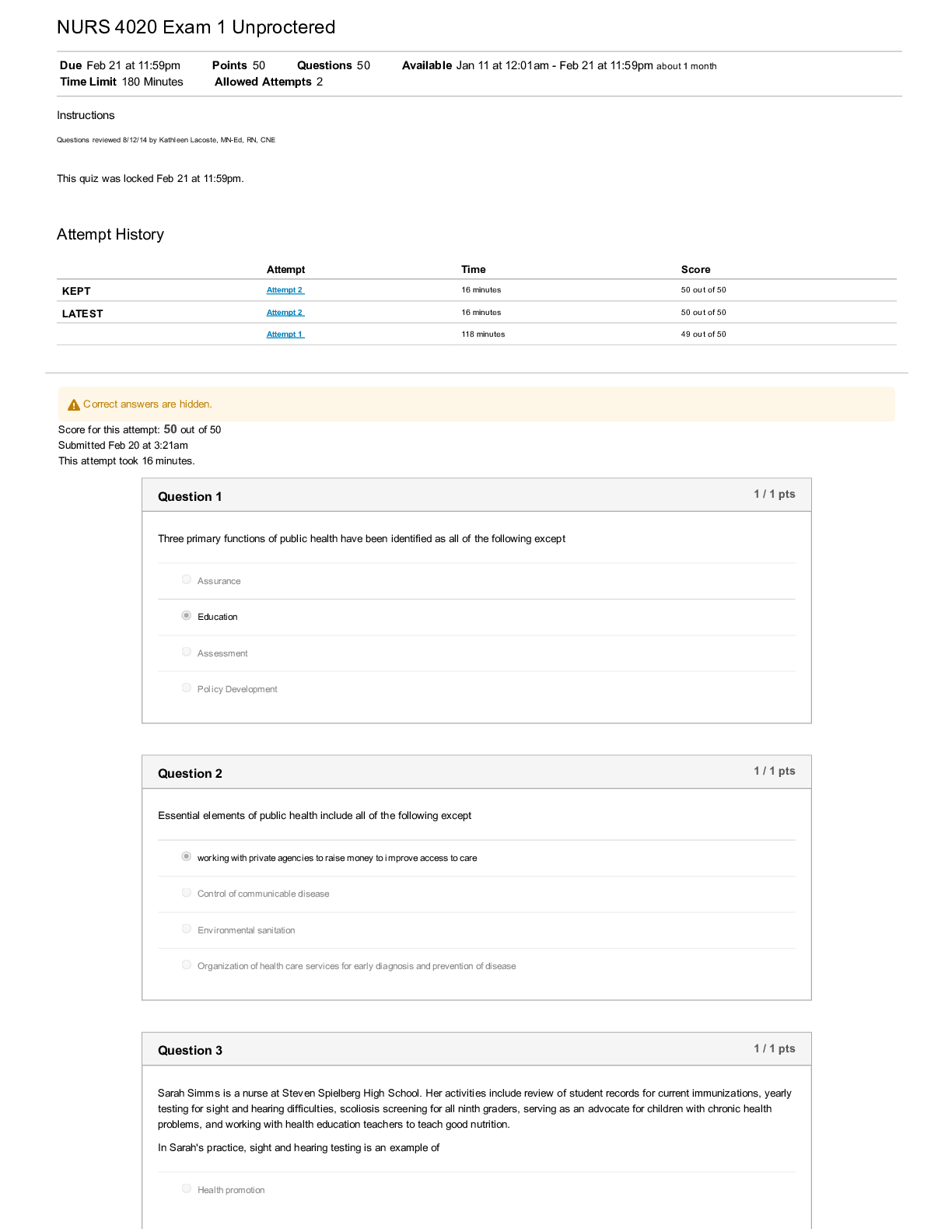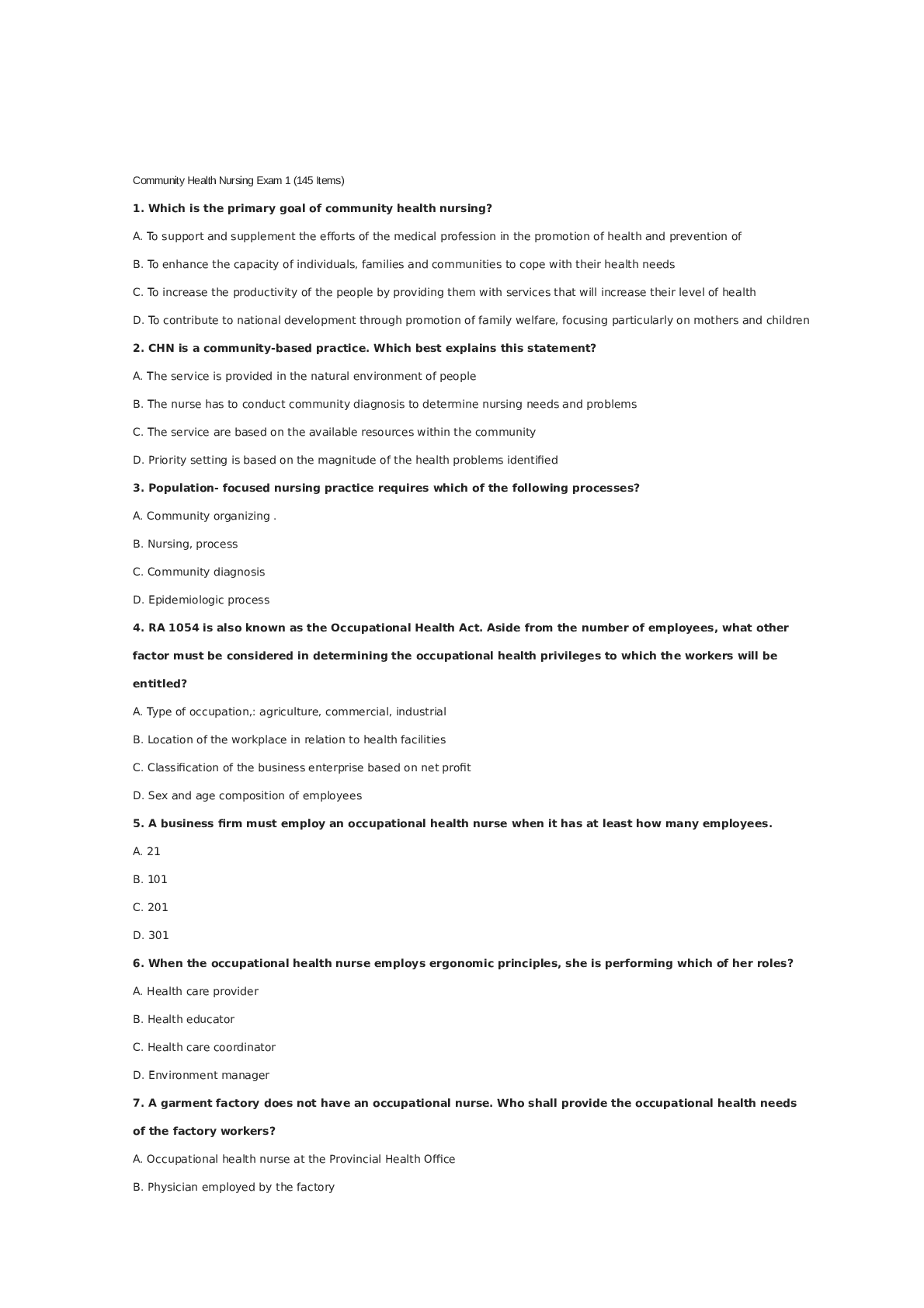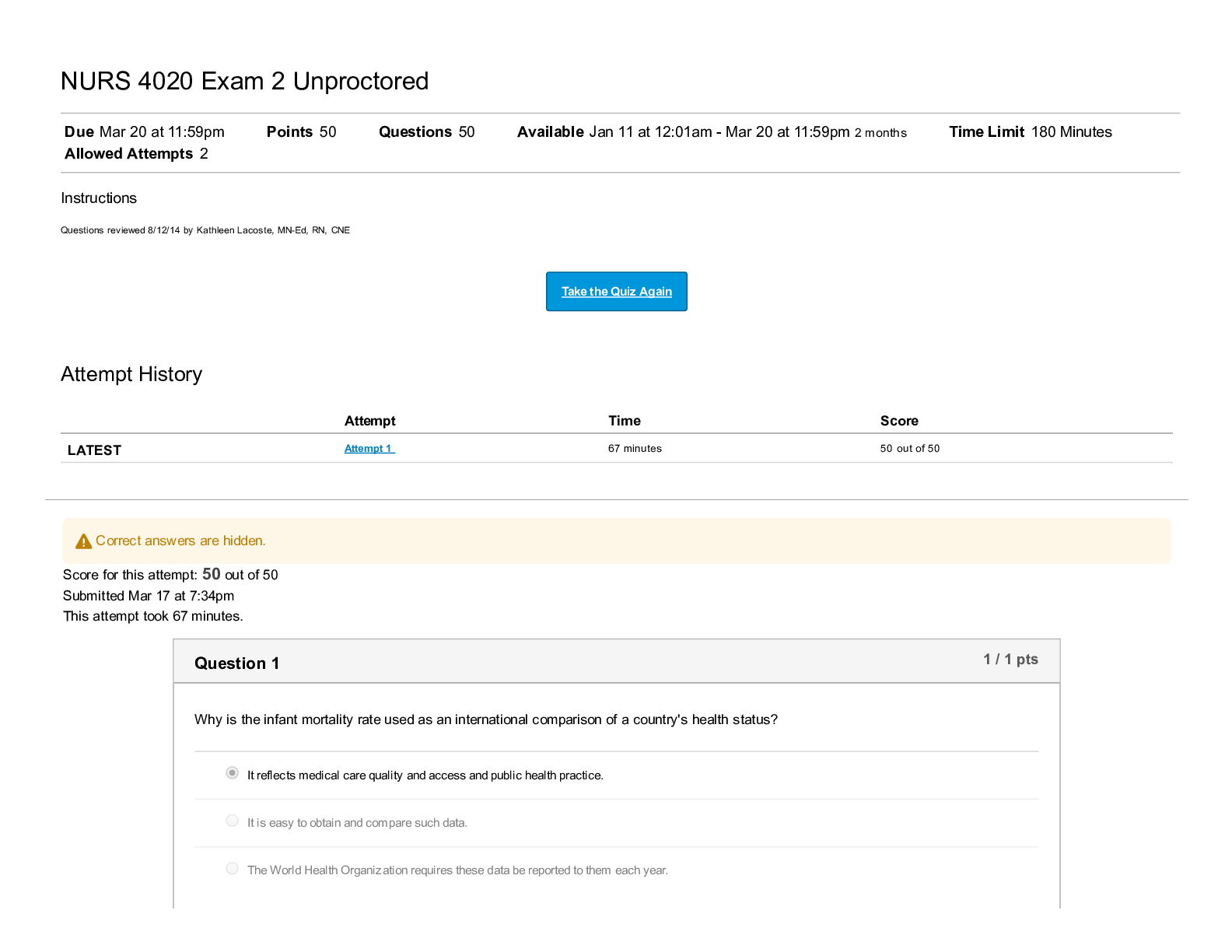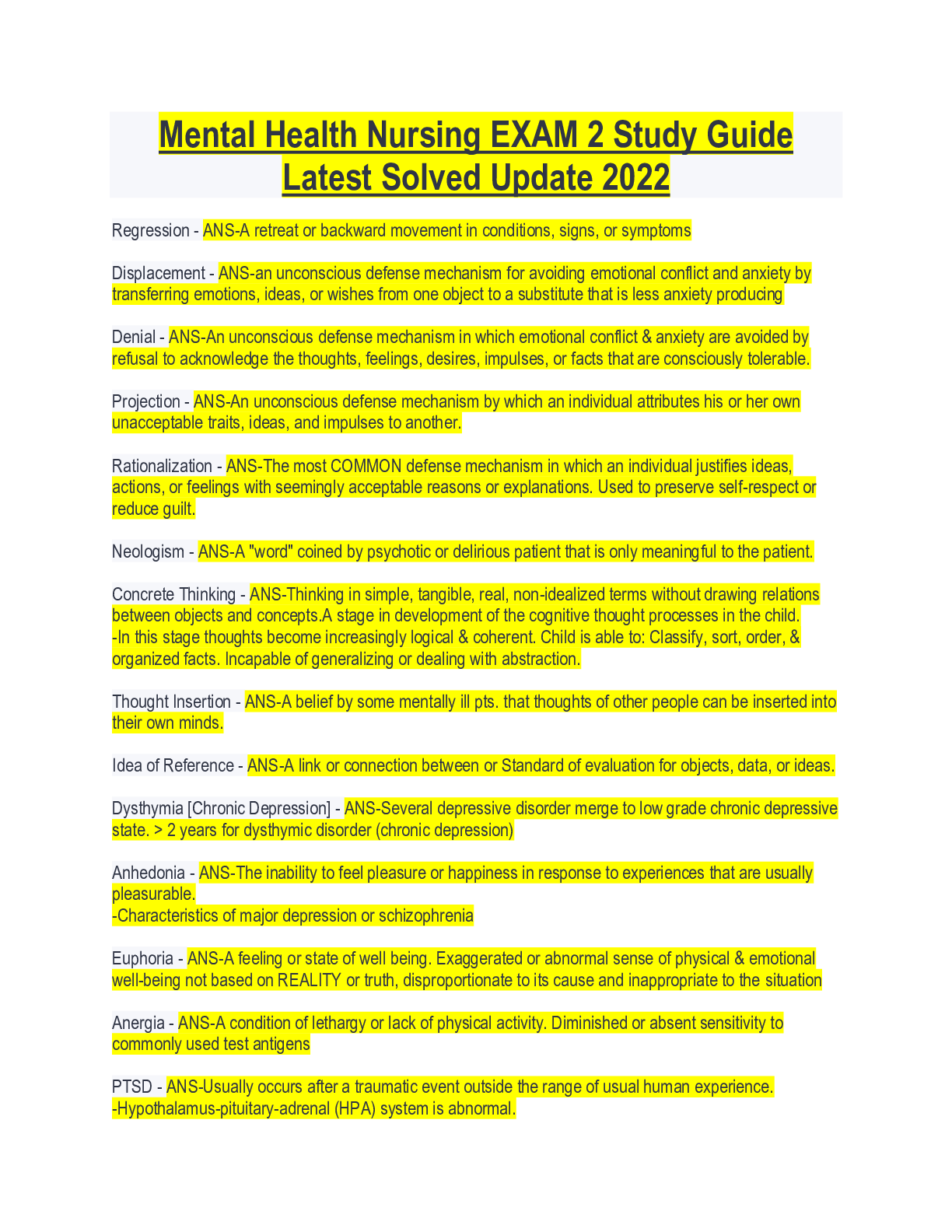*NURSING > QUESTIONS & ANSWERS > NUR2488 Mental Health Nursing Exam 2 (All)
NUR2488 Mental Health Nursing Exam 2
Document Content and Description Below
User Lindsey Nelson Course NU249/NUR2488 Section 06 Mental Health Nursing - Online Plus - 2017 Winter Quarter Test NU239 NUR2488 Mental Health Nursing Exam 2 updated Started 2/13/17 3:00 PM Submi... tted 2/13/17 3:00 PM Status Completed Attempt Score 40 out of 50 points Time Elapsed 37 minutes out of 1 hour Results Displayed All Answers, Submitted Answers, Feedback Question 1 1 out of 1 points You are the nurse responsible for assessing for extrapyramidal side effects in a patient who has been taking chlorpromazine. Which of the following may be side effects for this medication? (Select all that apply.) Akathisia Acute dystonia Tardive Dyskinesia Answer s: Amenorrhea Akathisia Acute dystonia Tardive Dyskinesia Response Feedback: Extrapyramidal side effects of the central nervous system include involuntary motor movements, resulting in possible dystonia, akathisia or dyskinesia. Amenorrhea is a possible side effect of chlorpromazine, but is not an extrapyramidal side effect. Question 2 1 out of 1 points An adult with depression has been treated with medication and cognitive behavioral therapy. The patient now verbalizes that being passive and letting others make decisions for her contributed to the depression. What referrals could the nurse make to help this patient prevent recurrence of depression? Selected Answer: Social skills training Answers: Social skills training Use of complementary therapy Relaxation training classes Learning desensitization techniques Response Feedback : Social skills training is helpful in treating and preventing the recurrence of depression. Training focuses on assertiveness and coping skills that lead to positive reinforcement from others. Use of complementary therapy refers to adjunctive therapies such as herbals. Assertiveness would be of greater value than relaxation training because passivity has been identified as a concern. Desensitization is used in treatment of phobias Question 3 1 out of 1 points A patient with suicidal impulses is placed on the highest level of suicide precautions. Which measures should be incorporated into the plan of care by the nurse caring for the patient? (Select all that apply.) Selected Answers: Maintain arm’s-length distance, institute one-on-one nursing observation around the clock Allow no glass or metal on meal trays Remove all potentially harmful objects from the patient’s possession Answers: Maintain arm’s-length distance, institute one-on-one nursing observation around the clock Allow no glass or metal on meal trays Keep patient within visual range while awake, but only check every 15 to 30 minutes while the patient is sleeping Only check the patient’s whereabouts every 15 minutes and make frequent verbal contacts. Remove all potentially harmful objects from the patient’s possession Response Feedback : One-on-one observation is necessary for anyone who has limited control over suicidal impulses. Plastic dishes on trays and the removal of potentially harmful objects from the patient’s possession are measures included in any-level suicide precautions. The remaining options are used in less stringent levels of suicide precautions. Question 4 0 out of 1 points Which statement indicates a patient with major depression’s most likely outlook on life during the acute phase of the illness? Selected Answer: “If I ignore this, it will go away.” Answers: “It’s just a matter of time and I’ll be well.” “I deserve to be this way.” “I can fight this and get better.” “If I ignore this, it will go away.” Response Feedback: Patients with depression feel worthless and often believe they deserve to have “bad” things happen. Patients with depression are usually hopeless and would not respond optimistically. Patients with depression usually feel helpless and unable to fight. Question 5 0 out of 1 points The nurse knows that sedation is a side effect of many antipsychotics. Which of the following medications should the nurse question if ordered for a patient taking antipsychotics? Selected Answer: hydrochlorothia zide Answers: hydrochlorothia zide diphenhydrami ne acetaminophen verapamil Response Feedback: Diphenhydramine is an antihistamine that is likely to cause drowsiness and enhance the sedative effect of an antipsychotic. Hydrochlorothiazide (diuretic), acetaminophen (antipyretic and pain reliever) and verapamil (antihypertensive) do not cause sedation. Question 6 1 out of 1 points The nurse is caring for a patient who experiences orthostatic hypotension related to taking chlorpromazine. The nurse should suggest which of the following interventions for managing this side effect? Selected Answer: Sit on the side of the bed before standing up. Answers: Stay in bed for an hour after taking the medication. Sit on the side of the bed before standing up. Stand quickly, then wait a moment before walking. Take the medication with milk or food. Response Feedback : Sudden position changes lead to dizziness associated with postural hypotension, so arising slowly from sitting or lying down is a good suggestion. It’s not necessary to stay in bed for an hour after taking the medication. The patient should not stand quickly, as this can lead to a sudden drop in blood pressure. Taking the medication with milk or food will not affect blood pressure. Question 7 1 out of 1 points The nurse is evaluating the effectiveness of an antipsychotic on negative symptoms of psychosis. Which of the following symptoms would be classified as negative symptoms of psychosis? Selected Answer: flat affect Answers: illogical speech bizarre behavior delusions flat affect Response Feedback: Muscle rigidity, hyperpyrexia, tachypnea, diaphoresis, and drooling are all symptoms of neuromuscular malignant syndrome (NMS). The primary indications of serotonin syndrome, tardive dyskinesia (TD) and pseudo-Parkinsonism do not include these symptoms. Question 8 1 out of 1 points During the maintenance phase of treatment a patient with bipolar disorder asks the nurse, “Do I have to keep taking this lithium even though my mood is stable now?” Which is the most appropriate response? Selected Answer: “Taking the medication every day helps prevent relapses and recurrences.” Answers: “You will be able to stop the medication in about 1 month.” “Usually patients take medication for approximately 6 months after discharge.” “Taking the medication every day helps prevent relapses and recurrences.” “It’s unusual that the health care provider hasn’t already stopped your medication.” Response Feedback: Bipolar patients may be maintained on lithium indefinitely to prevent recurrences. Helping the patient understand this need will promote medication compliance. [Show More]
Last updated: 1 year ago
Preview 1 out of 26 pages
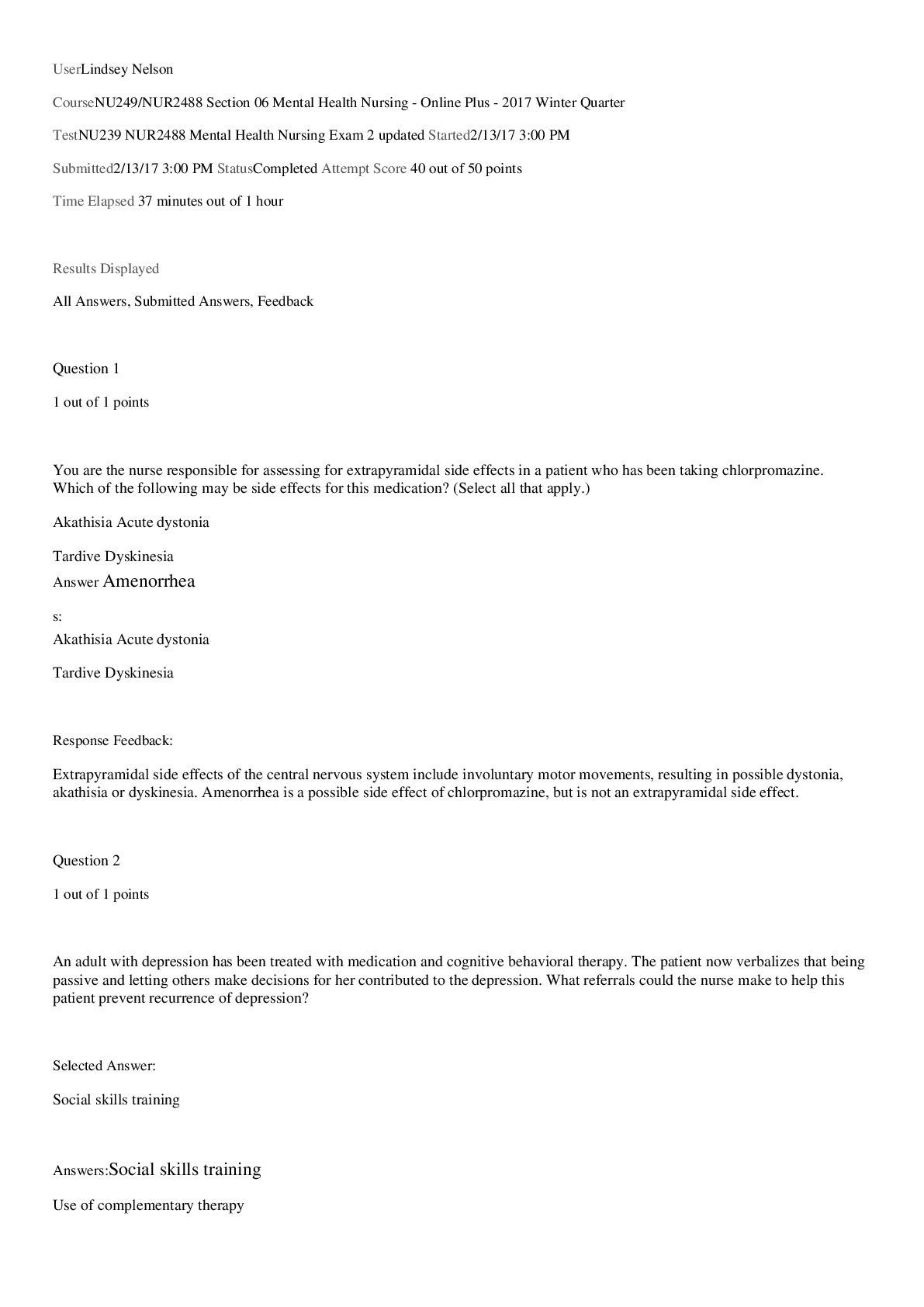
Reviews( 0 )
Document information
Connected school, study & course
About the document
Uploaded On
Jul 21, 2022
Number of pages
26
Written in
Additional information
This document has been written for:
Uploaded
Jul 21, 2022
Downloads
0
Views
100
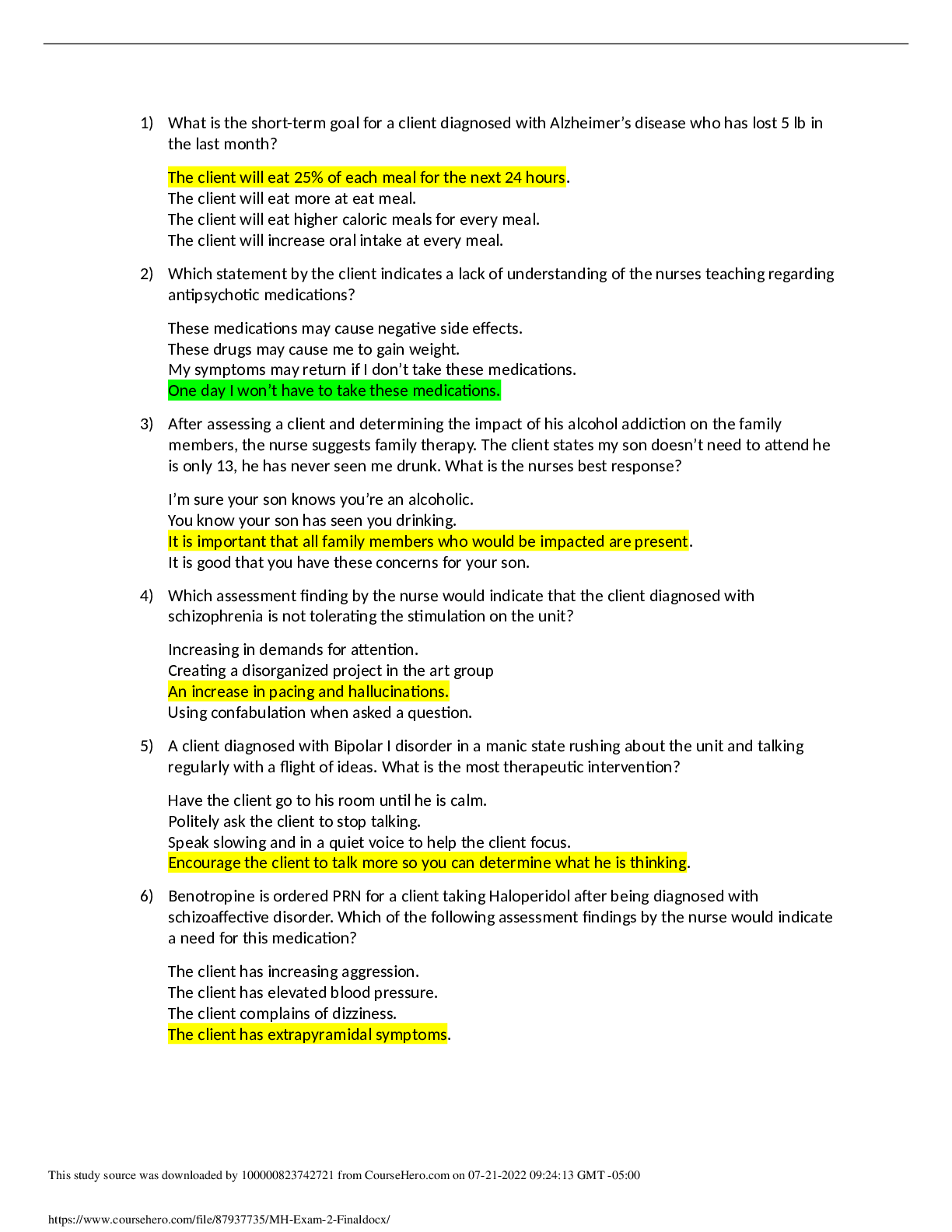

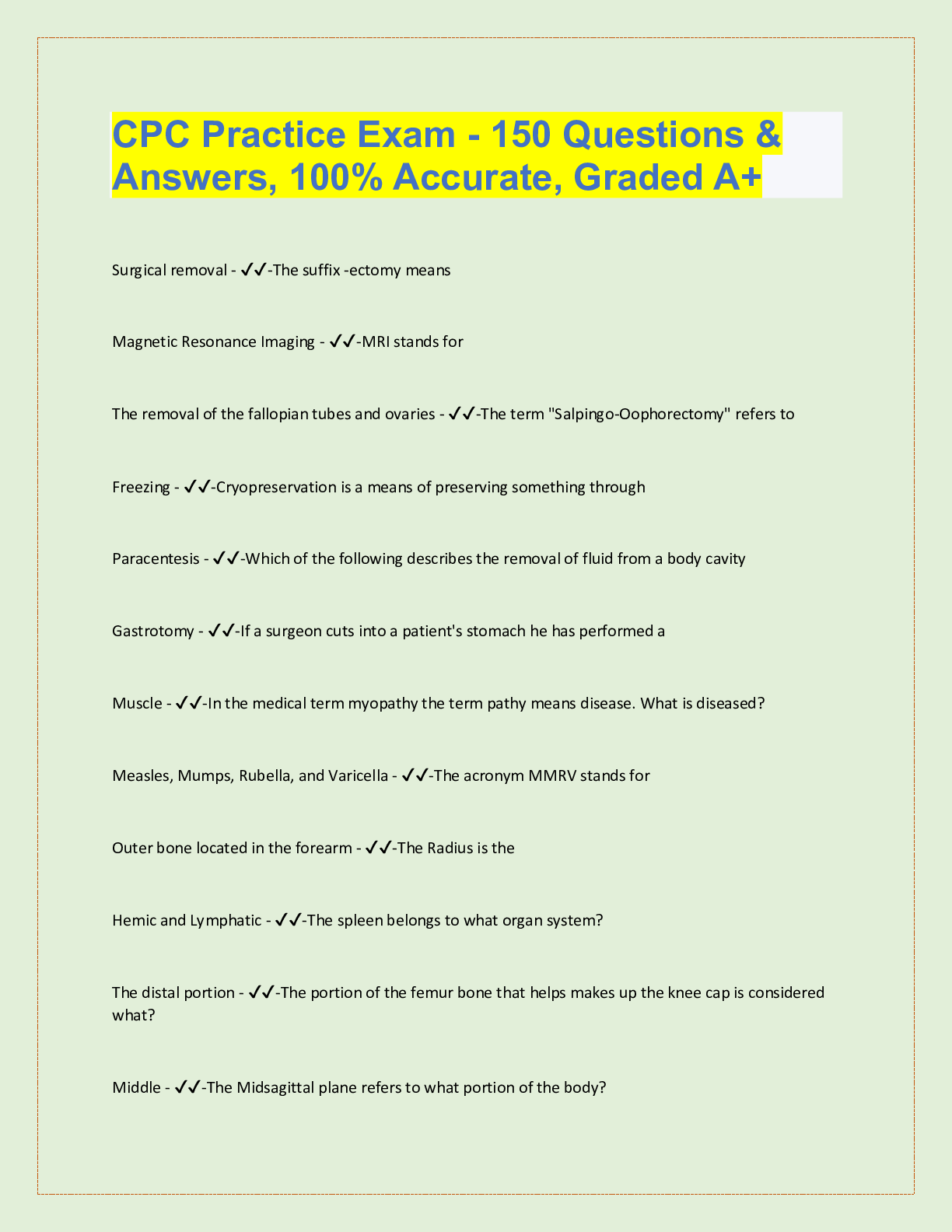

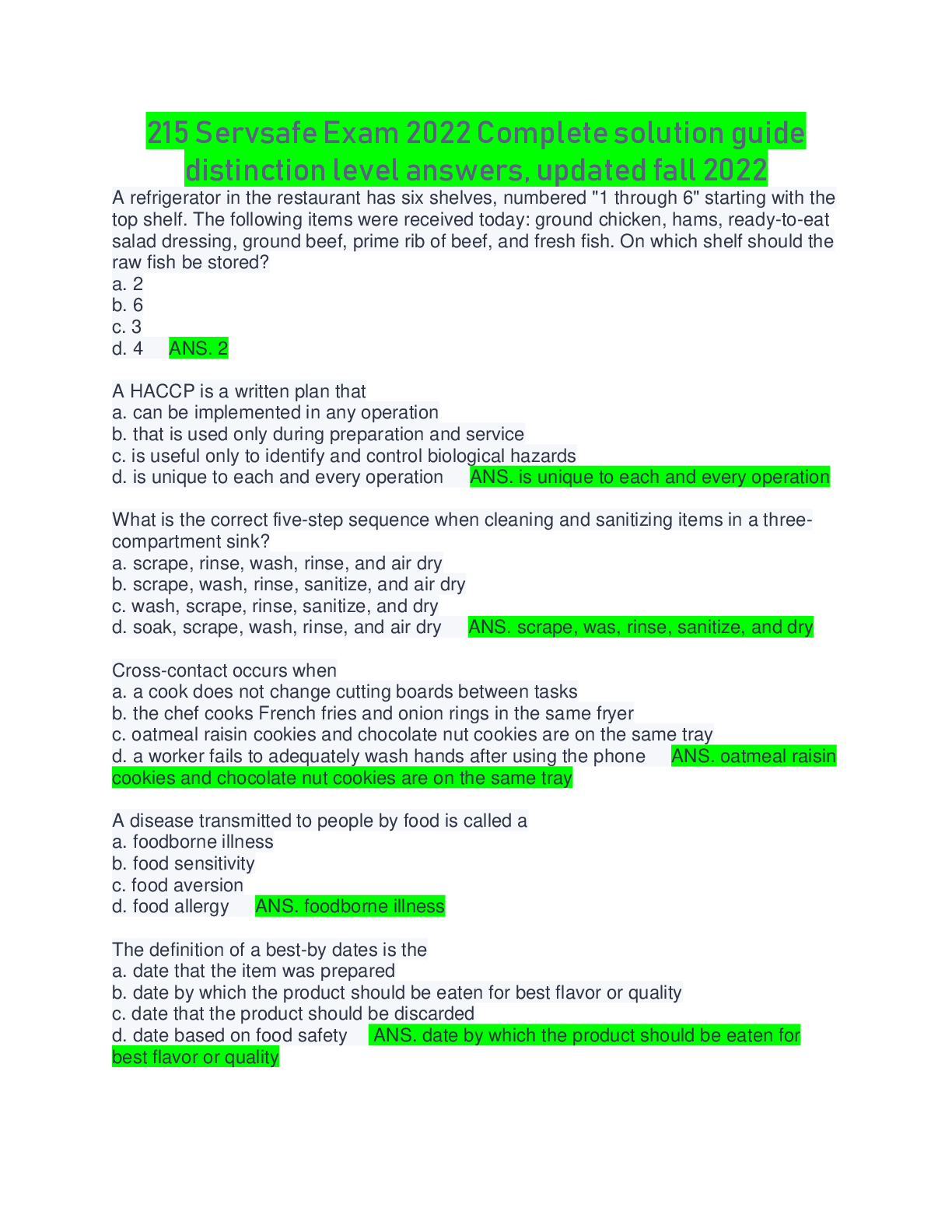

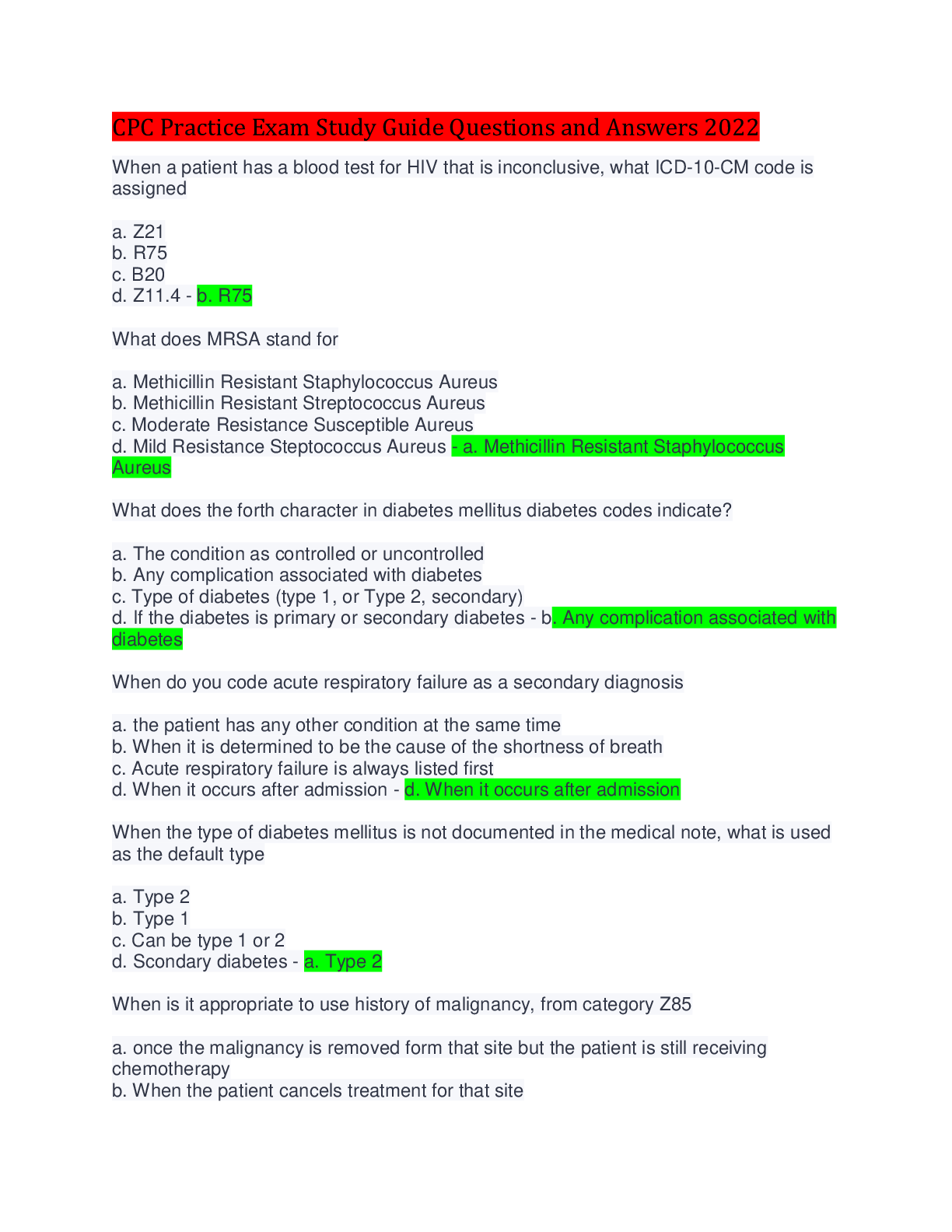
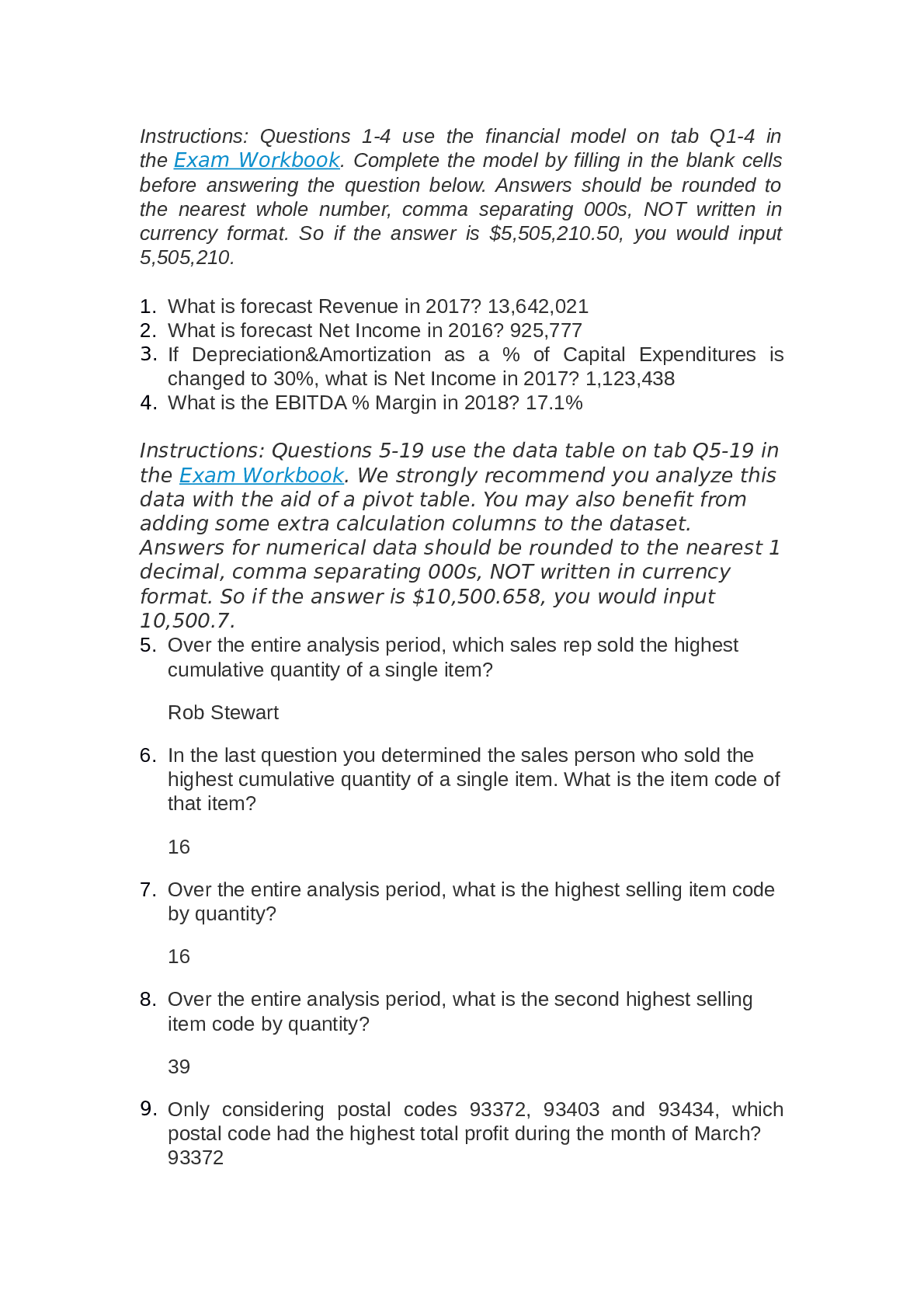
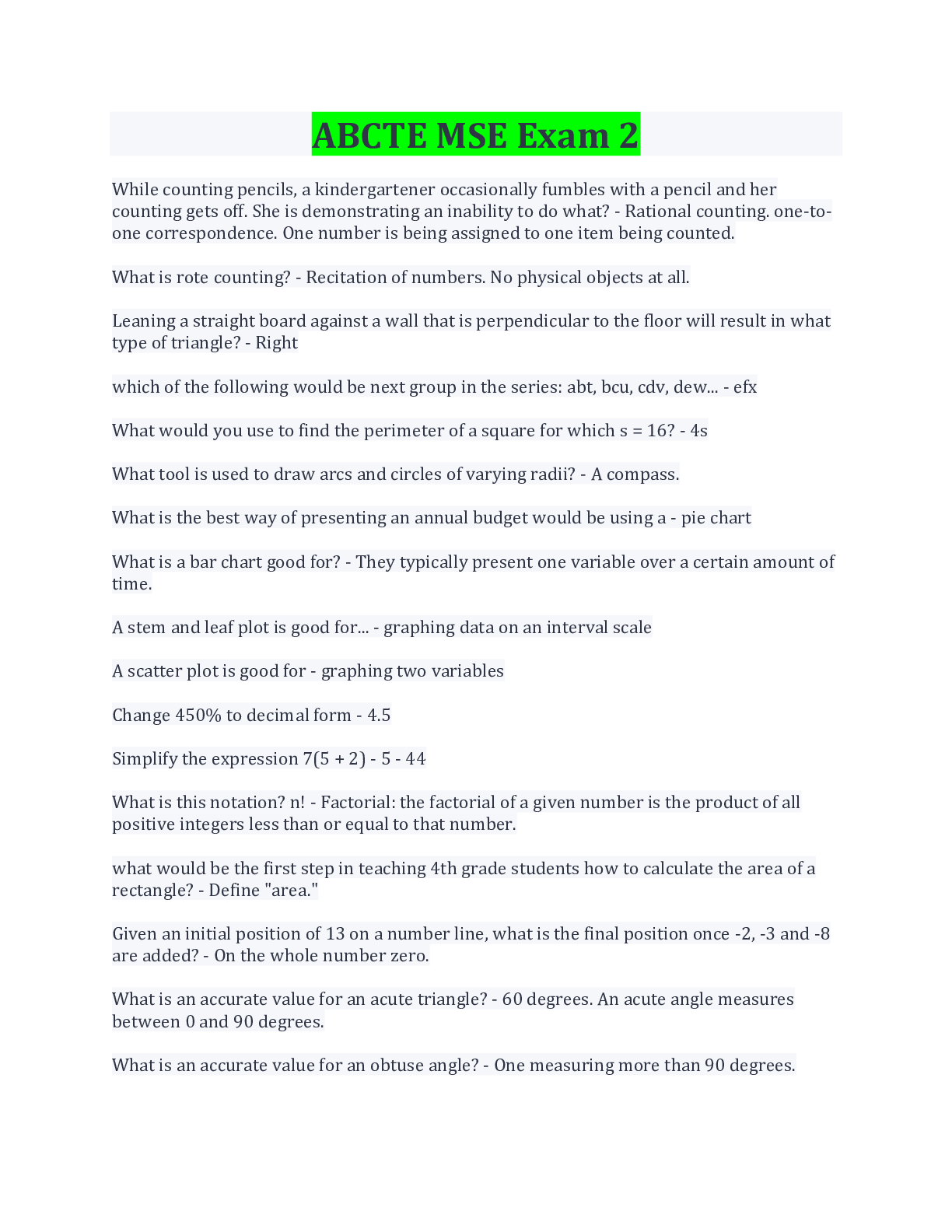
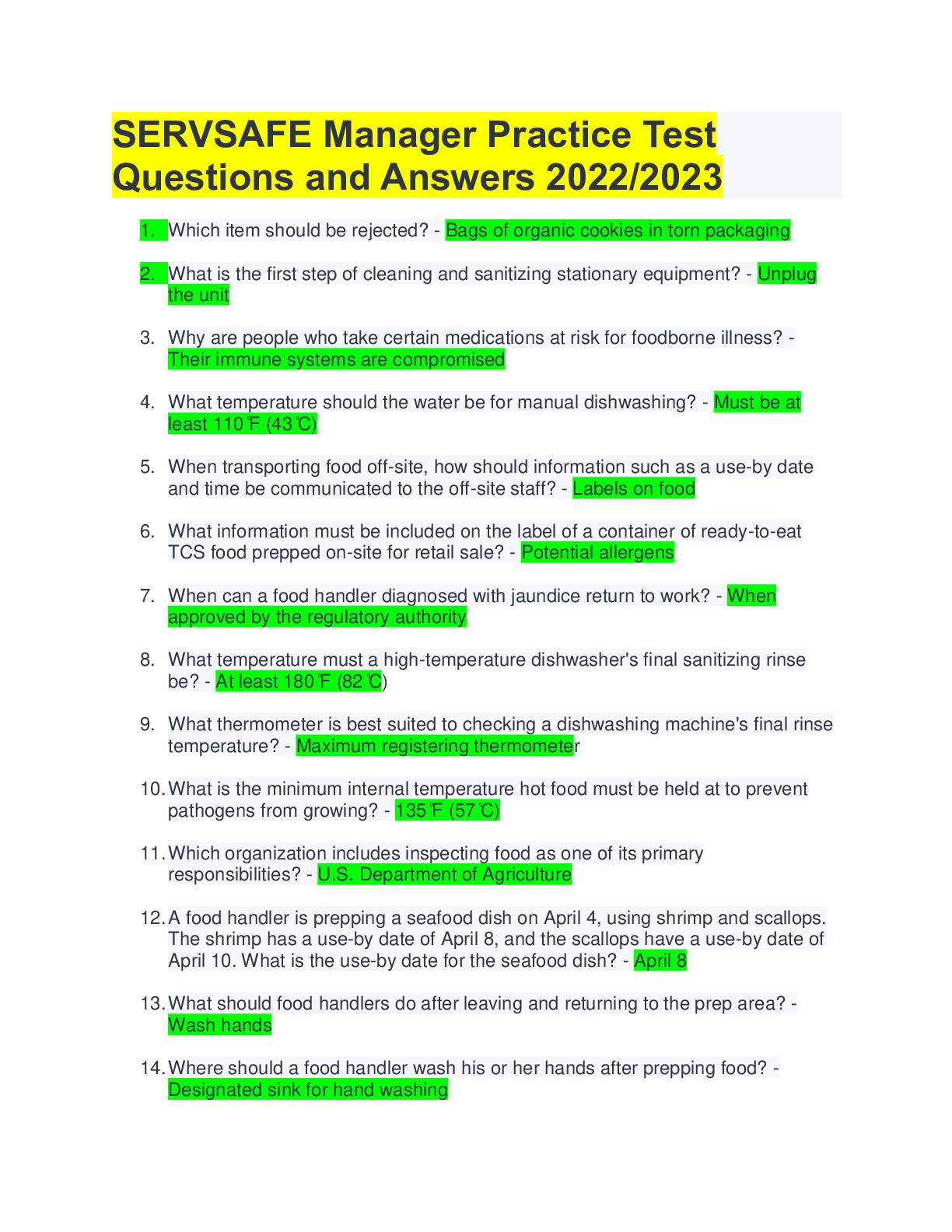


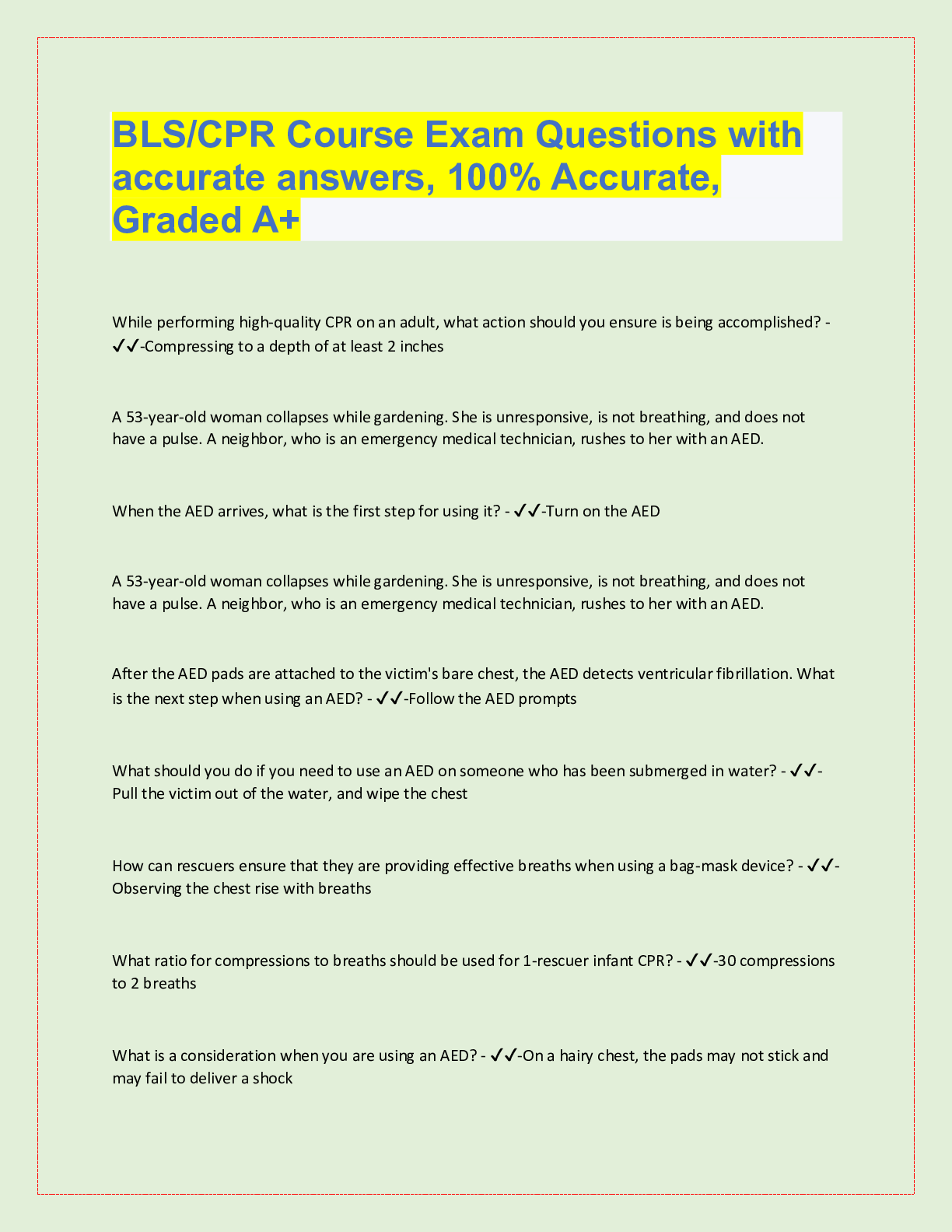
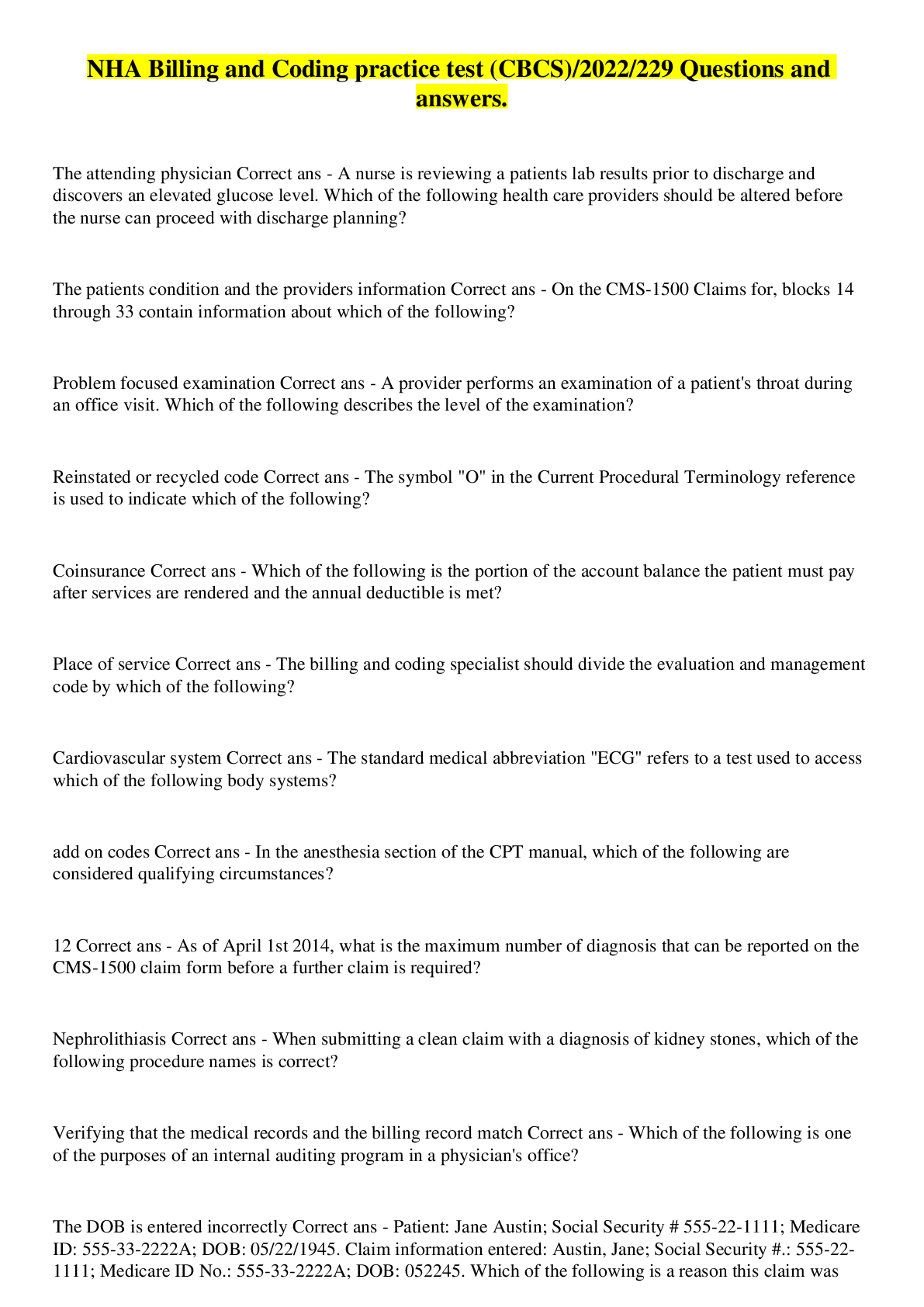
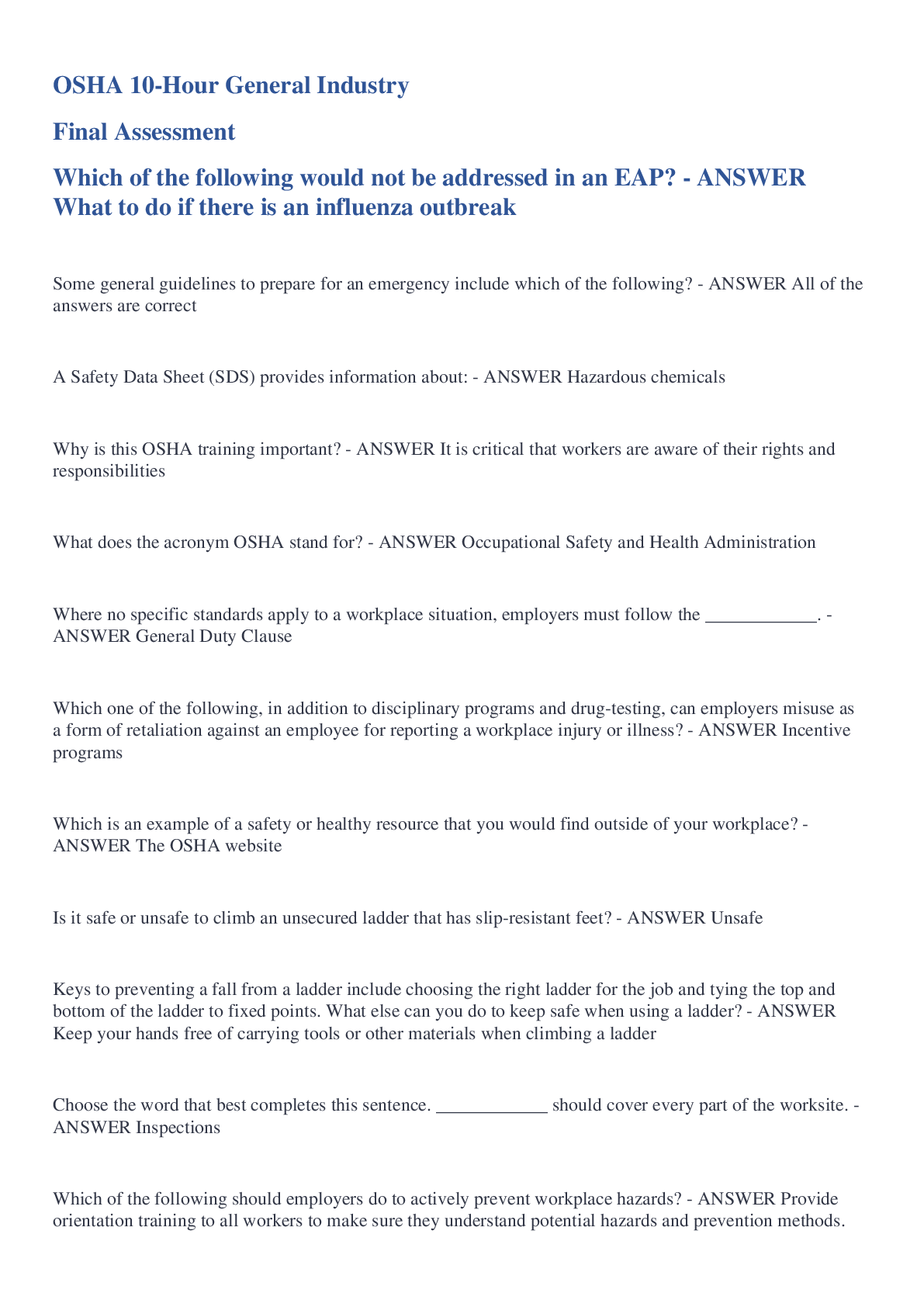

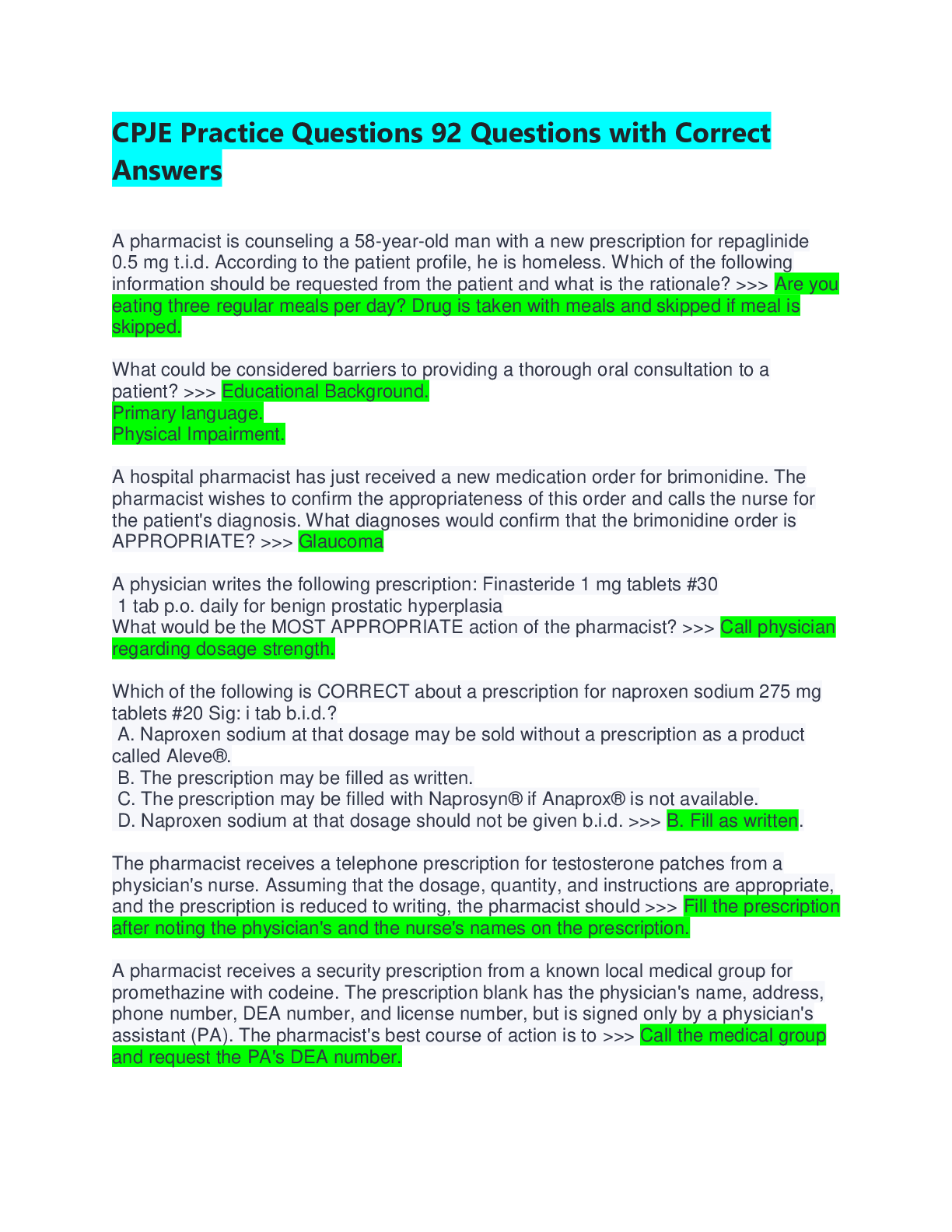
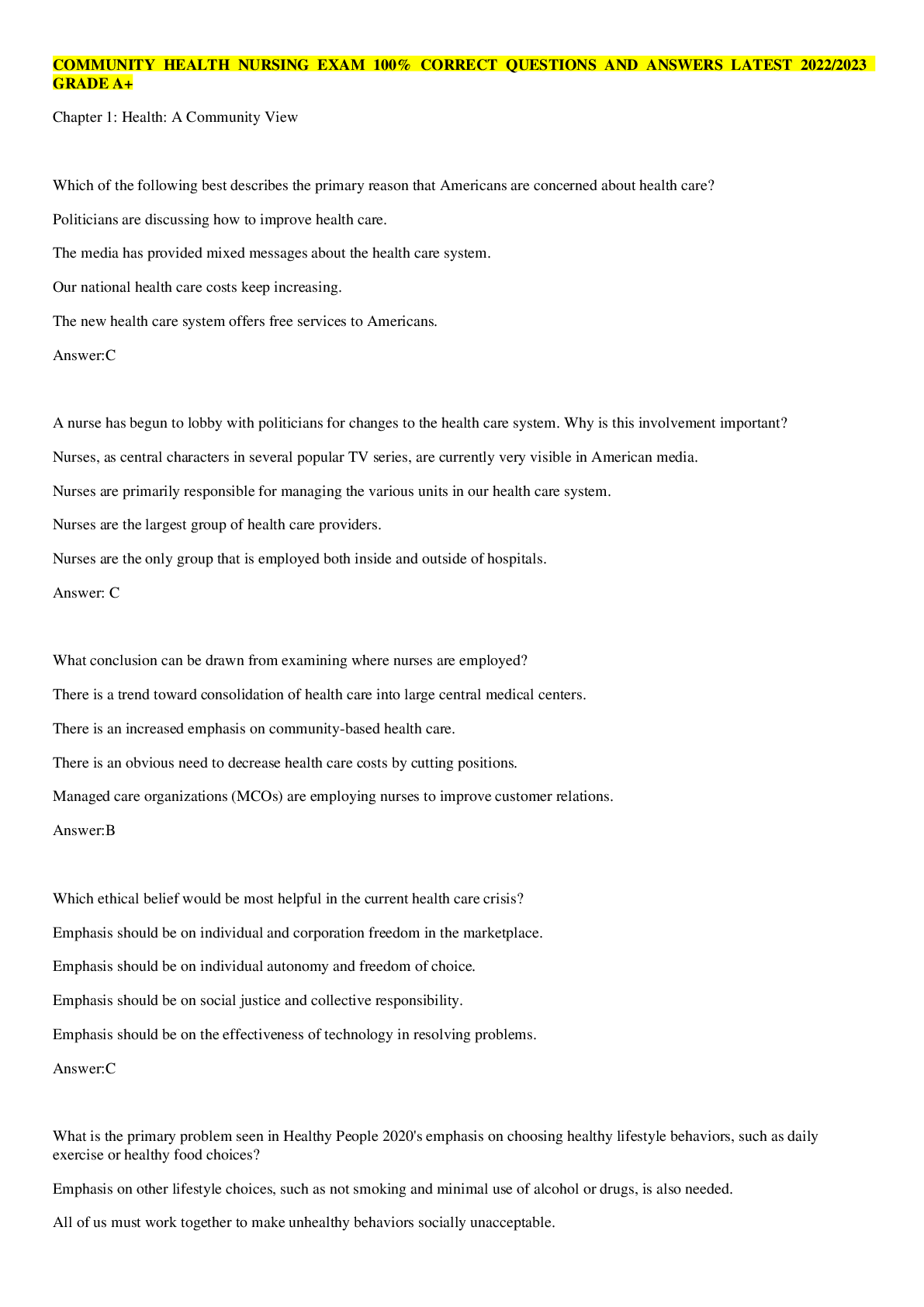
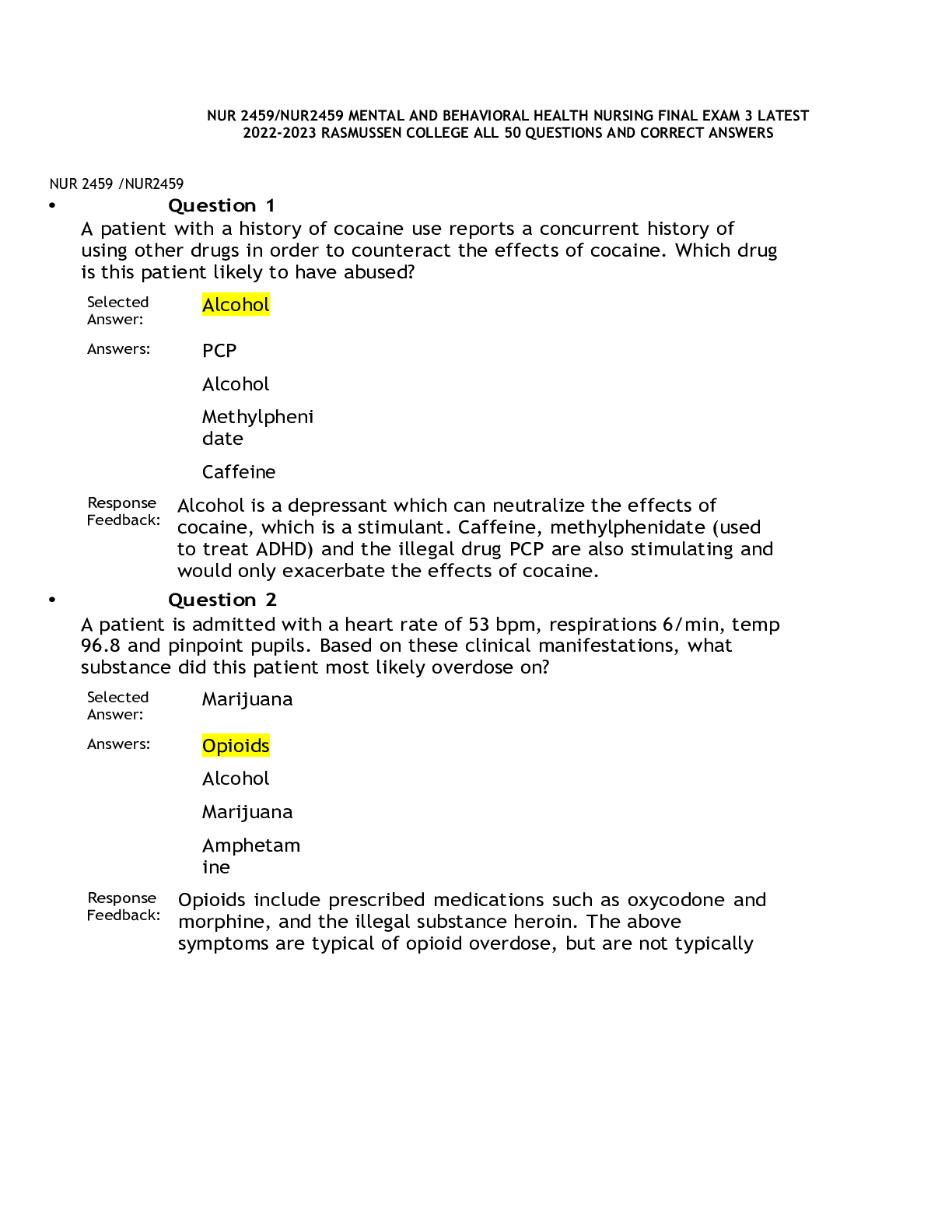
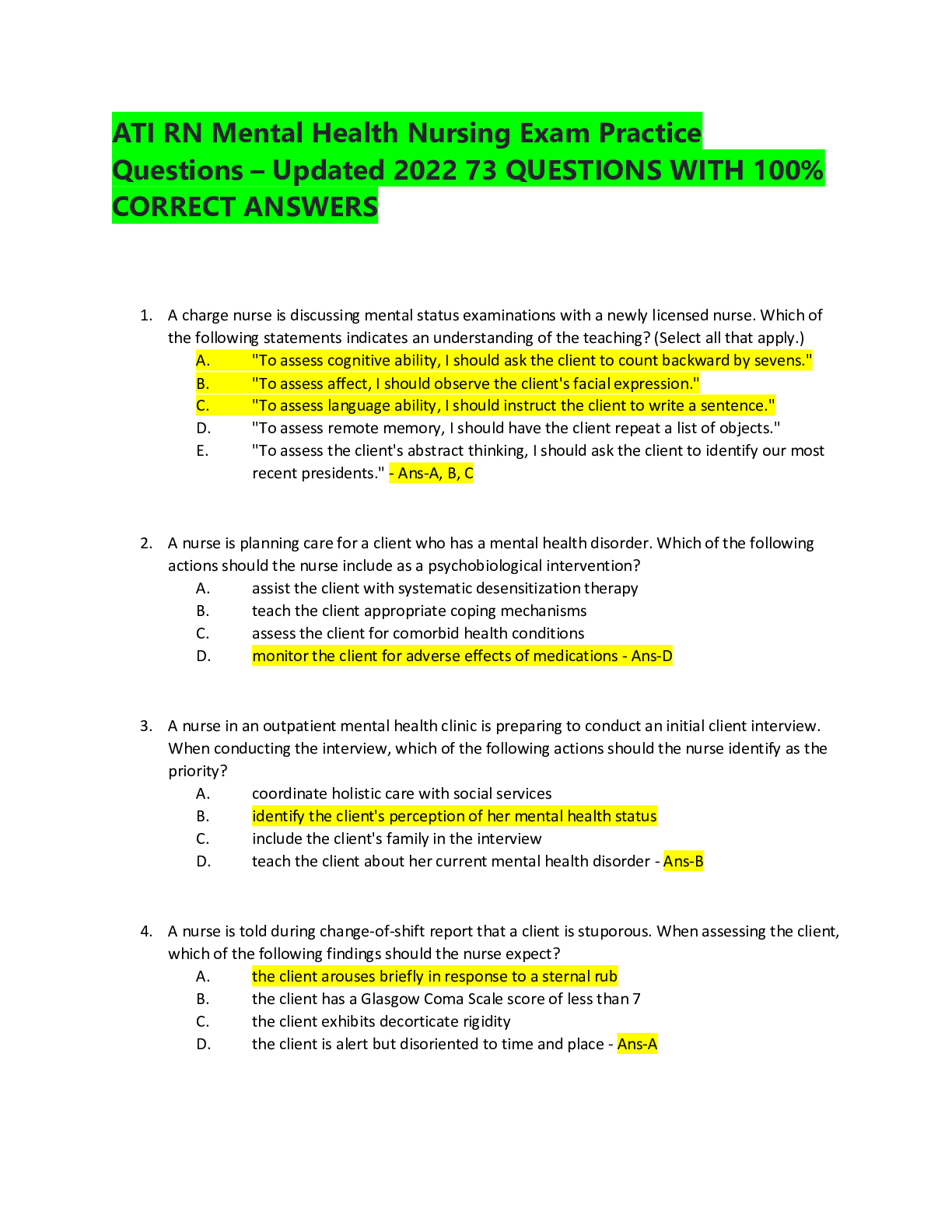
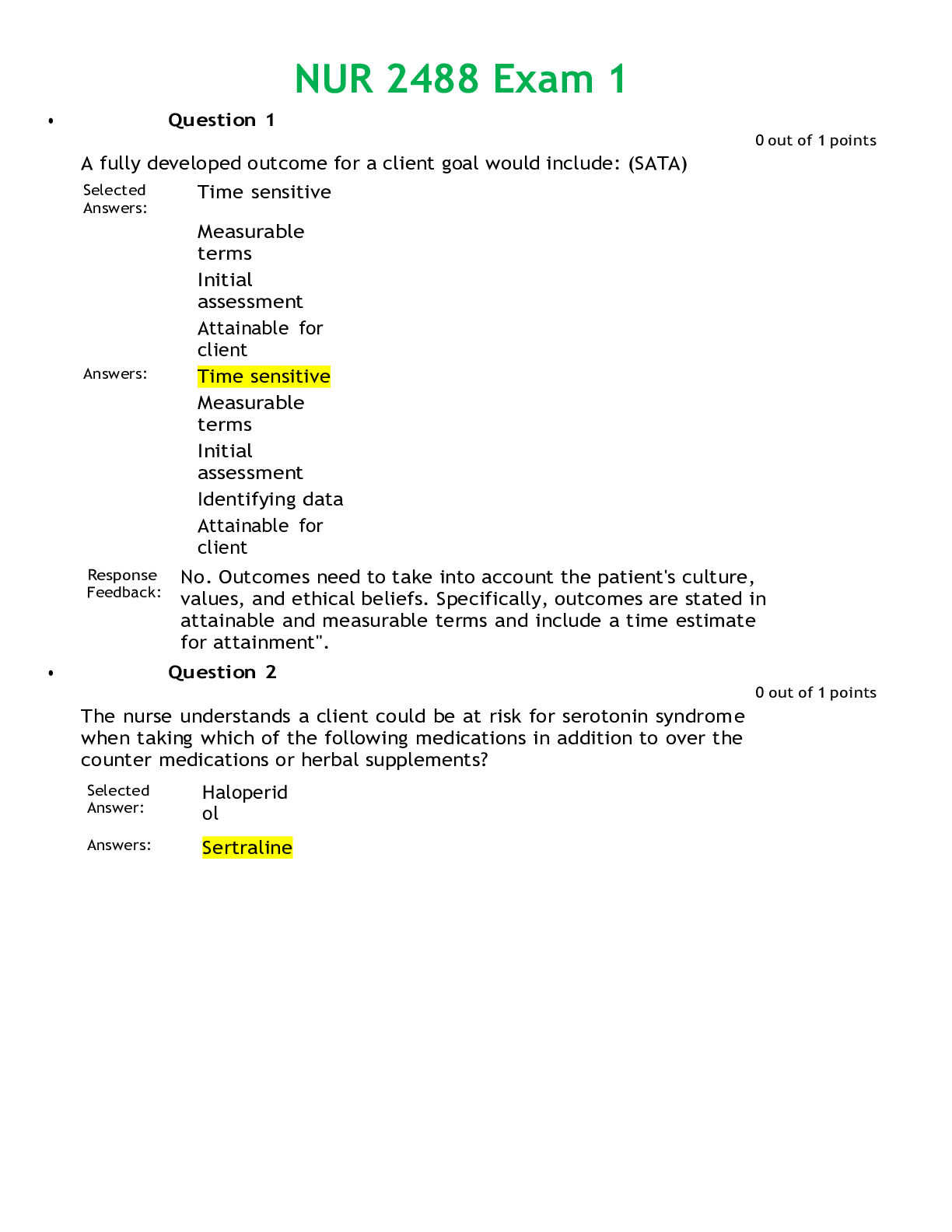
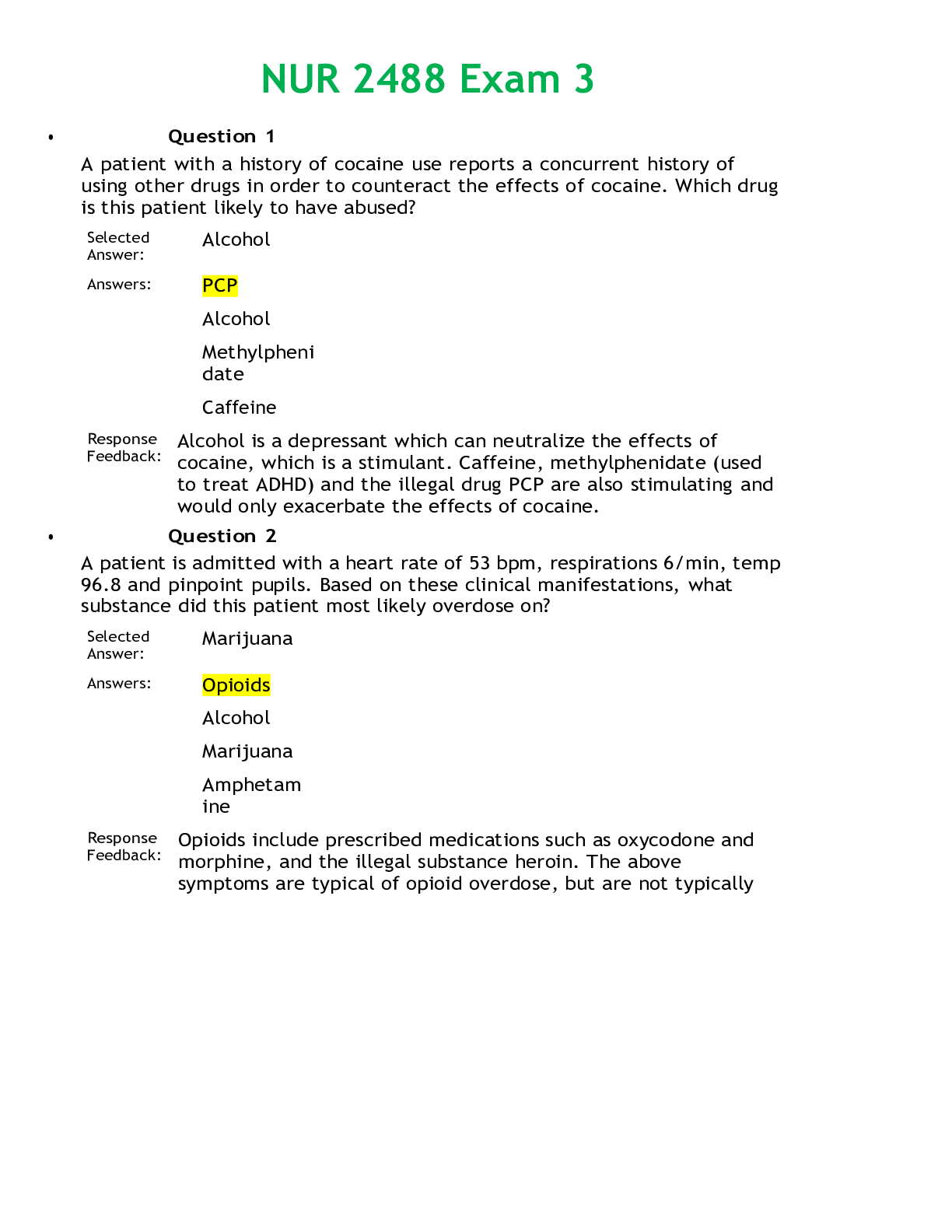
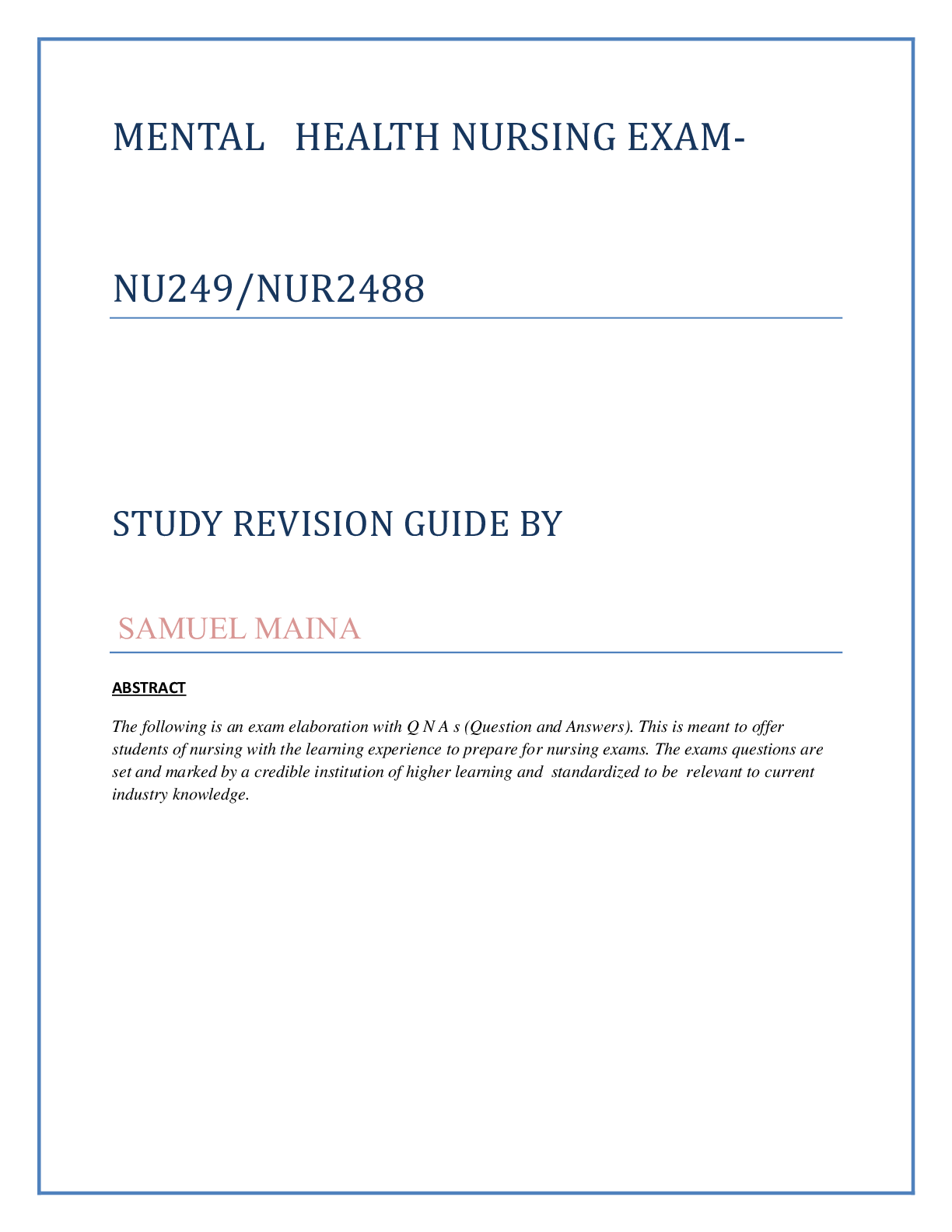

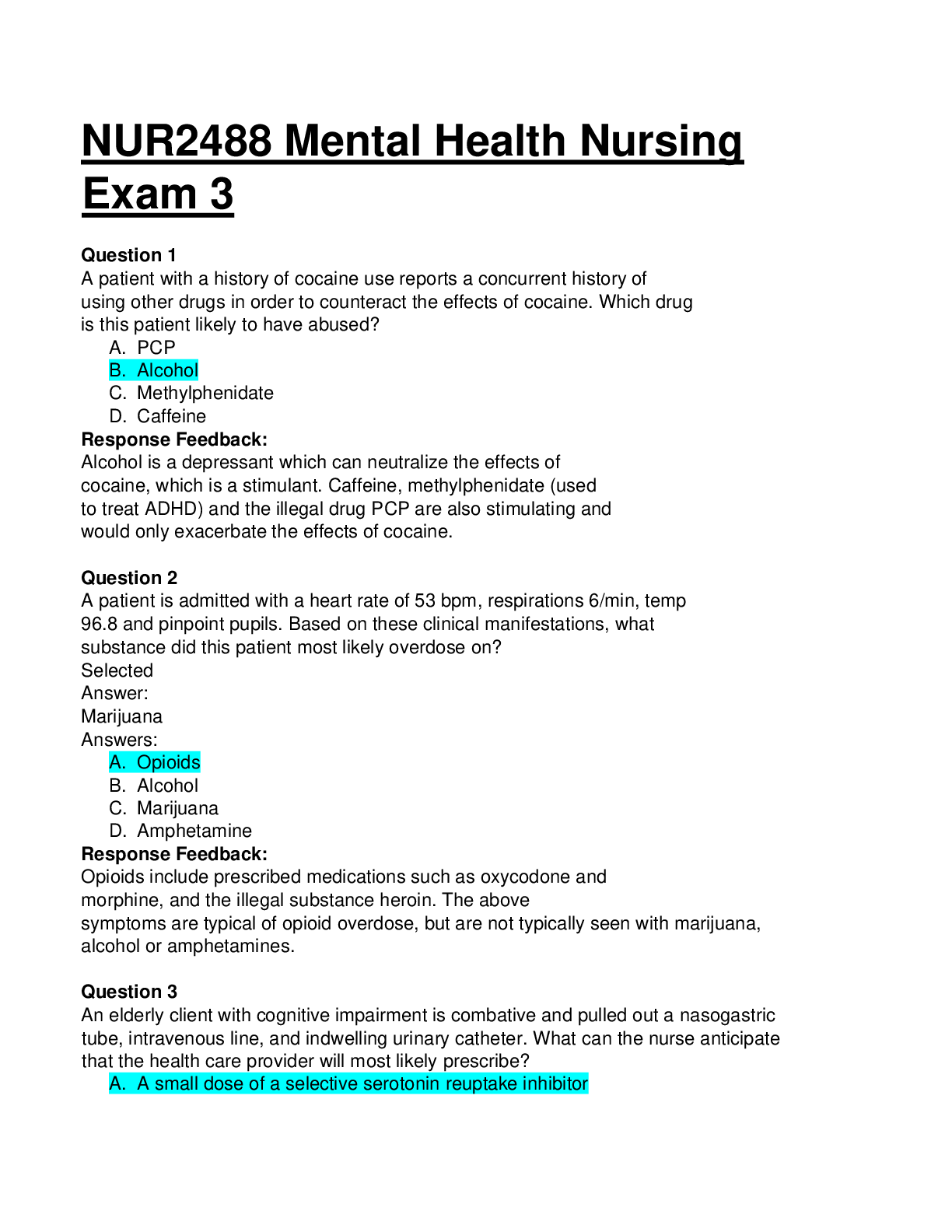
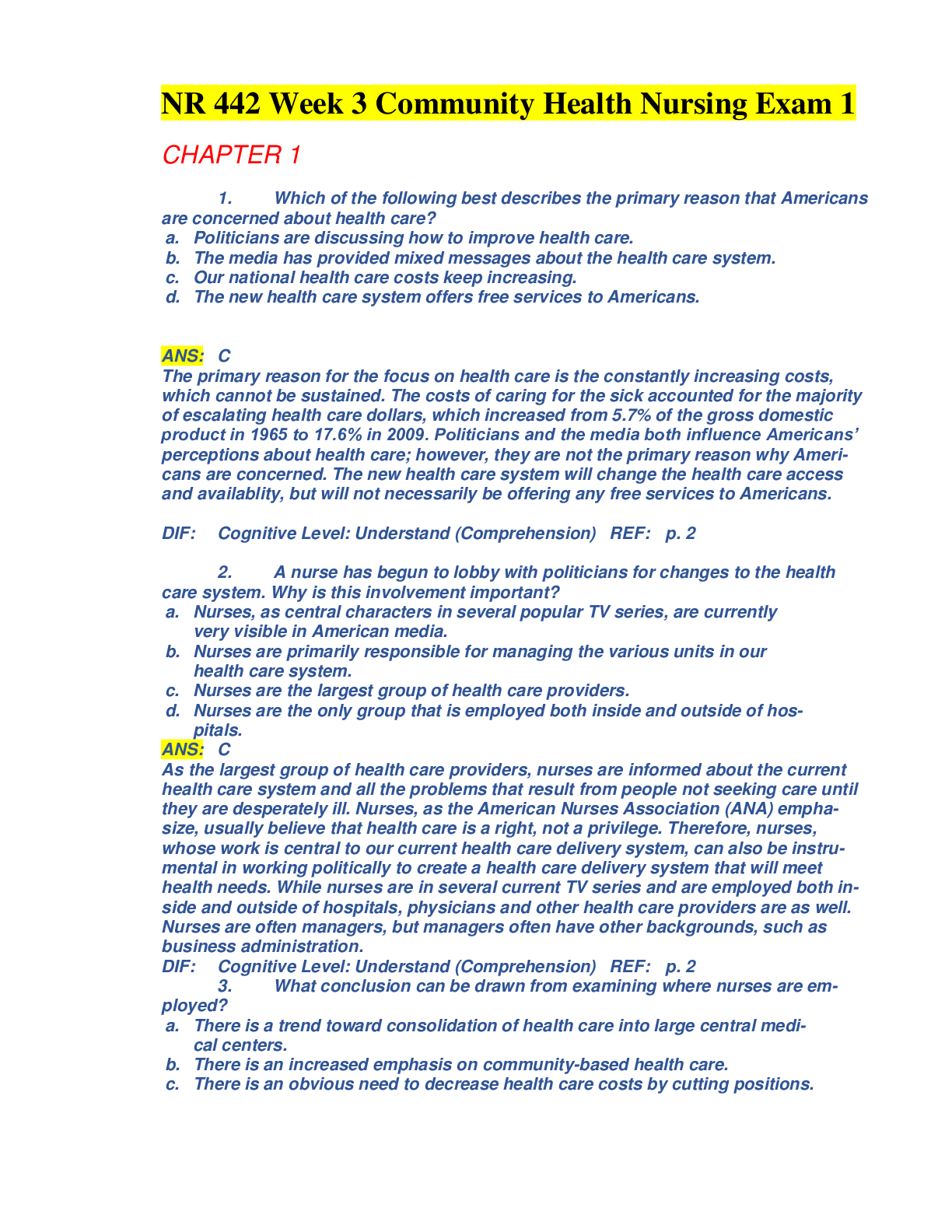
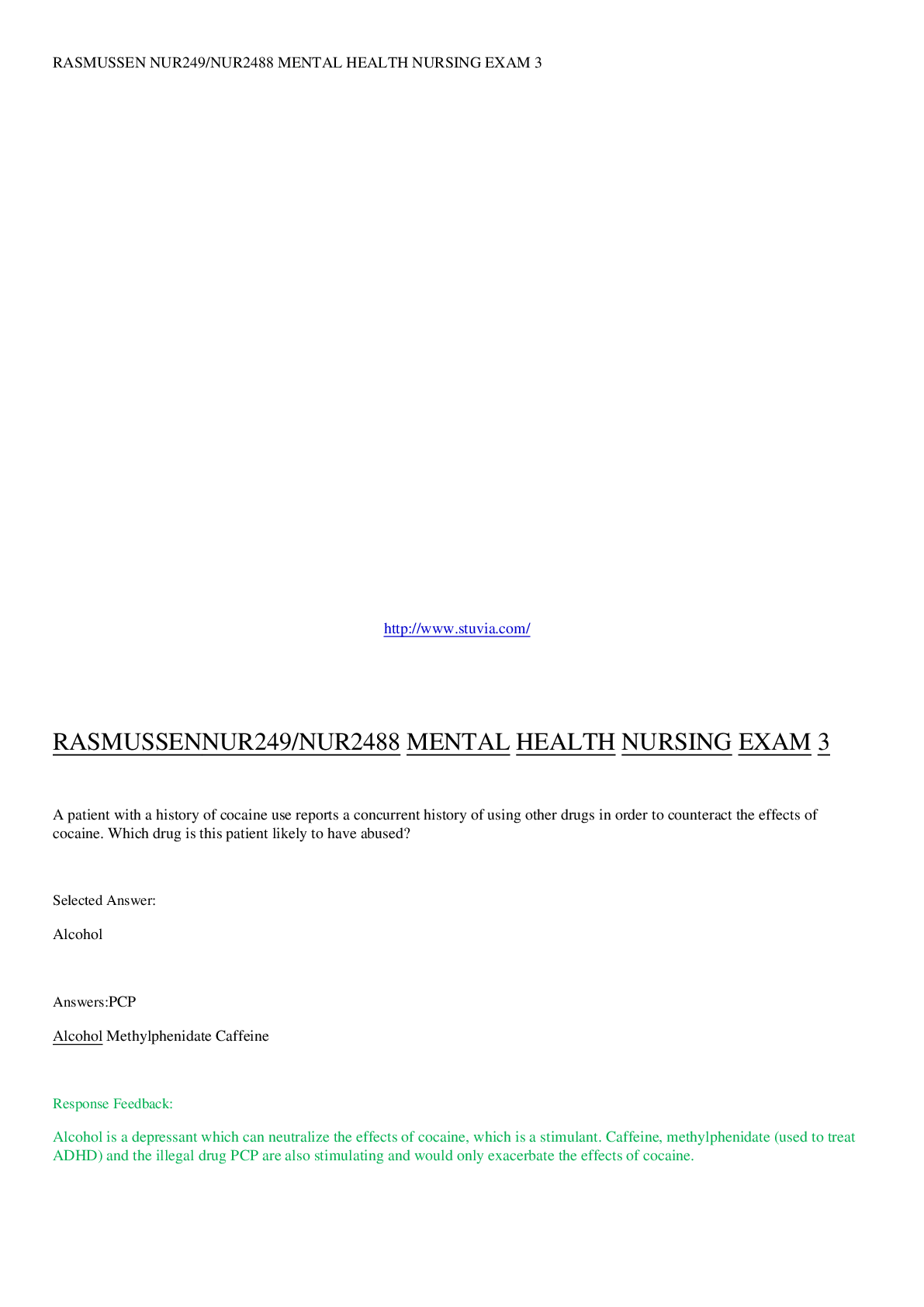
 ALREADY GRADED A.png)

